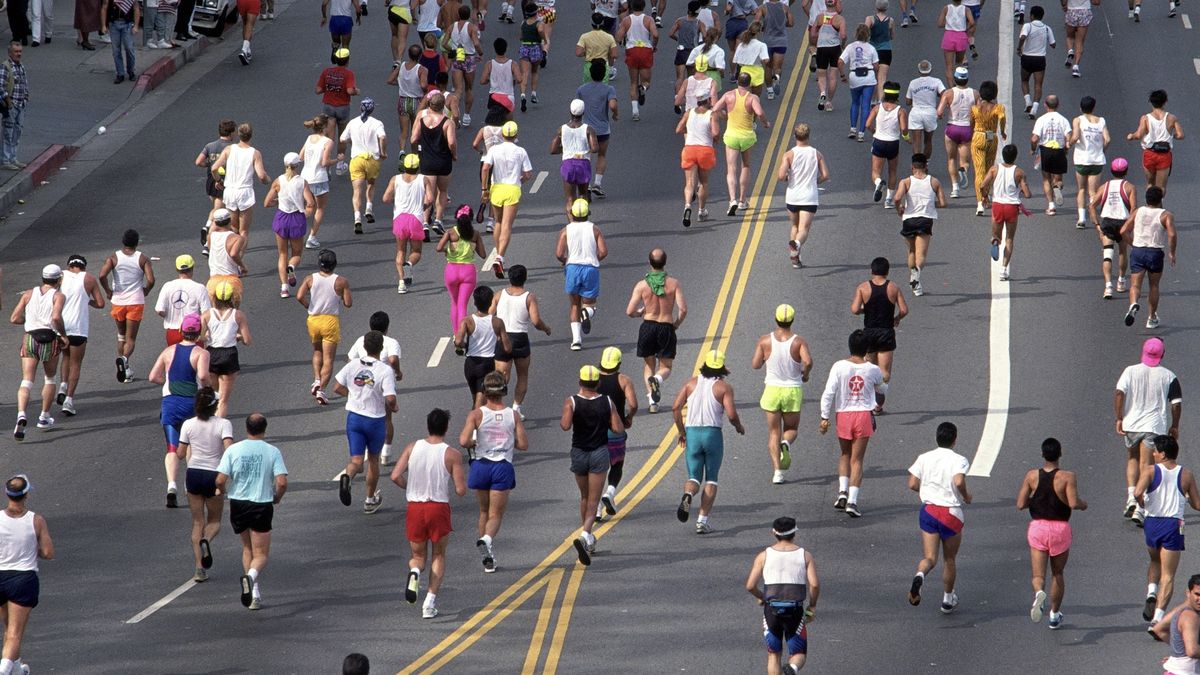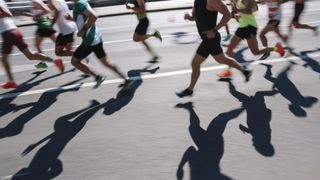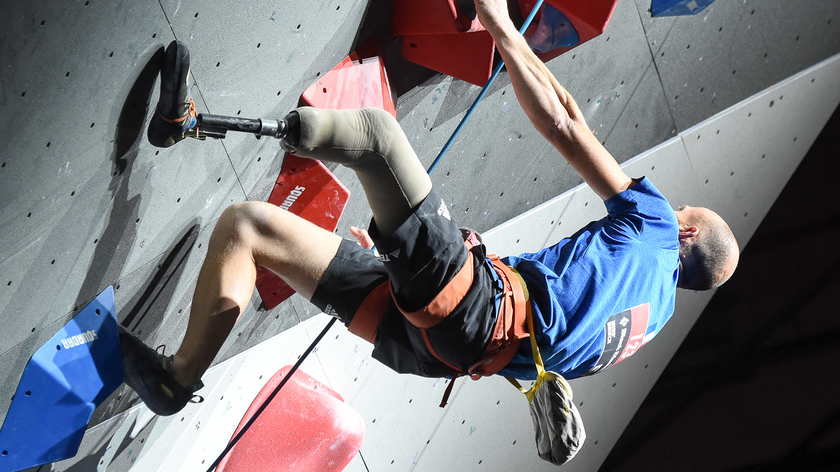What is race banditing, and why is it such a big deal?
Is it ever OK to run a race without signing up – and what about the legalities?

When a social media influencer from New York City boasted of completing the Brooklyn Half Marathon recently, she did not receive the reaction she had hoped for. Instead, she was chastised for admitting she completed the race without signing up.
The same happened with a runner in the Miami Half Marathon who said she had first made a fake bib number so she run the race – and then said she ran using someone else's entry. Either way, she also sparked anger and frustration from other runners.
These are two cases of so-called 'race banditing' – so why does it happen, and why is it so controversial?

What is race banditing?
Race banditing is when runners take part in a race unregistered. They might do the entire race without officially entering, run some of the race without signing up, or use the bib of someone else who has entered when the race rules do not allow this to happen.
Why do people become race bandits?
There are a number of reasons why runners become race bandits, whether it is a deliberate or unintentional act.
There are many more running races than there used to be, even a decade ago, and some runners might find the cost of entering events too expensive. The cost of an event should not be an excuse to become a race bandit, but there are runners who see their banditing as a protest against high entry fees.
There are also some runners who might not be familiar enough with race rules to know they are race banditing.
Advnture Newsletter
All the latest inspiration, tips and guides to help you plan your next Advnture!

Bib swap race bandits
There are runners who take the bib of someone else, perhaps because the runner who entered can't run. Some swaps are paid for, in that someone who has entered but can’t make the race, then sells to another runner but without re-registering. These bib swaps should only happen if permitted by race rules. Some race organizers forbid participant swaps.
There are other runners who have more potentially devious reasons for swapping a bib number, such as to gain an faster time for a race.
For example, if you are keen to gain a best for age time for a race like the New York Marathon, you might arrange with another runner that they take your bib and tracker and run a qualifying race time for you.
At best, it would seem morally unsound to ask another person to assume your identity to run a race, while at worst it could be classed as fraud.

Undercover race bandits
This type of race banditing sees runners jumping into a race for a section, or they join a race after the start. They will then run the race without a race number, or run the race without being identified.
These bandits might want to join a friend, or help pace another runner, while other want to complete the race but without having to pay. In this way, they get to enjoy the atmosphere and the route waymarking, plus marshalling and food stations, without contributing to the cost.
If caught, you might hear these race bandits protesting that they have the right too run on public roads or trails, so what’s to stop them doing so when the race is taking place?
These types of race bandits will fall into several camps: those who are simply unaware they are doing anything wrong; those that deliberately decide to run a race without paying; and runners who are more like conscientious objectors or campaigners for change.
Let's not forget that the first woman known to have run a marathon did so undercover. In 1966, Bobbi Gibb became the first woman to complete the Boston Marathon, but the 23-year-old hid in a bush near the start line and disguised herself in a hoodie after she was disqualified from officially entering the race because of her gender. Her actions could be classed as race banditing yet she is hailed as a hero,who set the road to giving women equal rights to run long-distance events.
These days, however, this argument for race banditing fails because all adults are welcome to apply to run races (although there are sometimes lower age limits for longer running races).
Faker race bandits
These race bandits act in a more deliberately fraudulent way. They aim to run with a fake bib and they are out to fool race organizers.
There might be different reasons for doing this. For example, the runner may have decided they want to do the race but don't want to pay, or they may want to run a race when all places have sold out. They might also have been banned from running and they feel they are 'forced' to enter fraudulently.
Still others might want to run the race without paying for an entry to make a point about something, such as to campaign for a race to be cheaper.
'Celebrity' bandits
Some social media influencers (like the one who ran the Brooklyn Half without entering) appear to be keen to boost their popularity by going against the rules, using the experience for content.

Does banditing really matter?
Race bandits are rarely condoned although there are some among the wider running community that believe race banditing is little more than a pest.
Indeed, Marathon Investigation has reported the allegations that there are running clubs – the finger was pointed at clubs in New York city – that promote banditing.
A major running magazine even published a Bandit’s Manifesto that appeared to give runners the green light to become bandits. The author wrote that while they believed banditing is wrong, if runners are going to do so there is a "useful list of how to be a race bandit without being an a**hole".
Some people might not care if other runners participate as bandits. An analogy might be that while some people see the theft of an apple from a tree in someone’s garden as “just one apple among many other apples”, others believe that it is straightforward theft.
For many people, however, the bottom line is that if you want to take part in a race, you should follow the correct procedures and pay.
Some race bandits get away with their actions simply because they go under the radar. If you are a runner who is likely to finish in the main pack, it might be that no one notices. If you run a race and finsish at the front of the field, there is a higher chance you will be caught.
Yet, for race organisers, the actions of race bandits are frustrating and also, in many cases, potentially damaging. It is easy to see how frustrating it is to organise a race and then find that not everyone has paid their way. These non-registered runners will most likely be a drain on resources, such as at food and water stations.
If an accident happens and a race bandit is involved this could affect the insurance of an event and leave other runners in potential danger. n the worst case scenario, a race organiser may be forced to cancel future events because their insurance has been invalidated by a race bandit's actions.
Undocumented participants are are also a security risk. If runners are not registered they might have joined the race with ill-intentions.
Other issues of race banditing
If runners are taking part in an event under false pretences, because they have swapped a bib with someone else or they have joined the race after the start line, this can affect overall results.
For example, if a race bandit has the bib of someone who is younger or older than them, then this will skew the age group results. Couples who swap bibs will adversely affect gender results, too.
This might seem like a minor infringement if you are a middle-of-the-bunch runner, but it could be a major issue if a race bandit affects the podium positions.
In addition, over-crowding on a race course could be a problem – or even dangerous – if greater numbers are race bandits. The more runners who take part in race banditing, the greater the crowds of runners become on the course.
Is banditing illegal, though?
The question of whether race banditing is illegal difficult to answer because it will depend on where you live and where the race is being held. There are various legal areas for race banditing to be considered, too, such as theft, fraud and trespassing.
An essay by Gabriela Zamfir, entitled Running in the Shadows: Analyzing Legality and Morality in Marathon Banditing and published in the Illinois Law Review, examines a number of points of law for race banditing. The article considers, among many points, that if someone enters a race without paying it can be argued they are gaining the advantage of the costs of organising an event, such as there price to close roads, signage and race marshalls.
If a runner makes a copy of a race bib to gain entry to a race, this could be classed as fraud.
The issue of trespass is tricky, however, because it different countries and regions have different rules on trespass. Zamfir's essay also looks at the argument that some race bandits believe that the roads are free for public use and that deciding to bandit is strictly an independent moral decision.
The law would also need to consider if a race bandit has knowingly committed an alleged crime. That is, if it can be proved that they were aware they were doing something wrong.
Would you out a race bandit?
If you know of a friend, acquaintance or influencer who is planning to be a race bandit, would you report them? The answer to this probably comes down to your thoughts on whether race banditing matters.
Certainly, given the outcry after some runners have revealed they are race bandits, shows that many people do care and consider race banditing to be cheating.

Fiona Russell is a widely published adventure journalist and blogger, better known as Fiona Outdoors. She is based in Scotland and is an all-round outdoors enthusiast with favorite activities including trail running, mountain walking, mountain biking, road cycling, triathlon and skiing (both downhill and backcountry). Aside from her own adventures, Fiona's biggest aim is to inspire others to enjoy getting outside and exploring, especially through her writing. She is also rarely seen without a running skort! Find out more at Fiona Outdoors.












